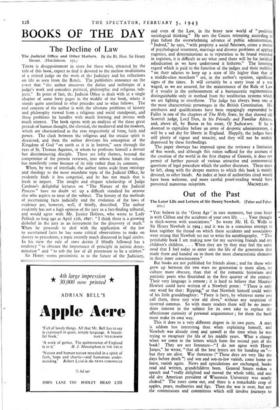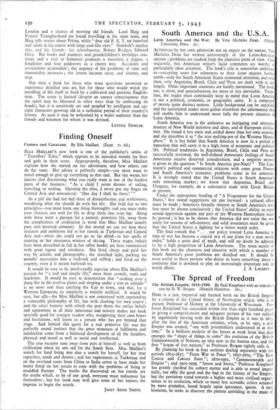The Later Life and Letters of Sir Henry Newbolt. (Faber
and Faber.
Out of the Past
"You believe in the ' Great Age' in rare moments, but your heart is with Clifton and the accidents of your own life. . . . Your thought is thick-woven with associations." So wrote Mr. H. G. Wells to Sir Henry Newbolt in 194 ; and it was in a conscious attempt to knot together the thread on which these accidents and associations were strung that Newbolt set out to write his autobiography. " This perishable book I am making now for my surviving friends and my children's children. . . • When they are 70 they may feel the same need that I feel today to enter into the life of the generation that made them and handed on to them the most characteristic elements in their inner consciousness."
But books are not published for friends alone ; and for those who grew up between the two wars no generation is more alien, no culture more obscure, than that of the romantic historians and patriotic poets who flourished in the first quarter of the century. Their very language is remote ; it is hard to believe that Maurice Hewlett could have written of a Newbolt poem : " There is only one word for that: Ripping," or that Newbolt himself could write of his little granddaughter : " Faery is faery, by whatever name you call them, these tiny wise old elves," without any suspicion of inverted commas. So with many readers there will be no imme- diate interest in the subject for its own sake to replace the affectionate curiosity of personal acquaintance ; for them the book must make its own way.
This it does to a very different degree in its two parts. A man is seldom less interesting than when explaining himself, and Newbolt was already tired and unwell at the time when he was trying to recapture the life of his middle years. What a change when we come to the letters which form the second part of the book ! They are not literature—"I do not agree with Henry Janes," he wrote, " that all the best letters are for handing on "- but they are alive. War threatens (" These days are very like the days before death ") and son and son-in-law vanish, come home on leave, vanish again. News and speculations are exchanged, books read and written, grandchildren born. General Smuts makes a speech and "really delighted and moved the whole table, and one old dry American president of Wisconsin University was nearly choked." The roses come out, and there is a remarkable crop of apples, pears, mulberries and figs. Then the war is over, but not the commissions and committees which still involve journeys to
London and a chance of meeting old friends. Lord Haig and Francis Younghusband are found travelling in the same train, and Haig tells stories about Petain, while " dear old F. E. Y. sat hunched and silent in his corner with large coal-like eyes." Newbolt's mother dies, and his friends : his schoolmaster, Robert Bridges, Edward. Grey. But books and journeys and grandchildren's birthdays con- tinue, and a visit to Somerset produces a moorhen, a dipper, a kingfisher and four goldcrests in a cherry tree. Accidents and associations accumulate ; the urgency of the problems of time and immortality increases ; the letters become rarer, and shorter, and stop.
Not then a book for those who want questions answered or experience distilled into art, but for those who would watch the unrolling of life itself as lived by a cultivated and patriotic Engliih- man. The scene is limited (despite an uneasy consciousness that the spirit may be liberated in other ways than by embracing its bonds), but it is sensitively set and peopled by intelligent and up- right characters growing old in a turbulent period of their country's history. As such it may be welcomed by a wider audience than the friends and kinsmen for whom it was devised.
LETTICE FOWLER.



























 Previous page
Previous page